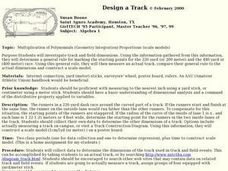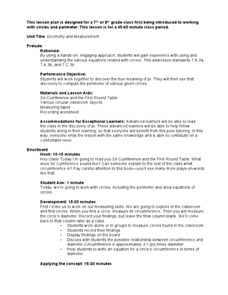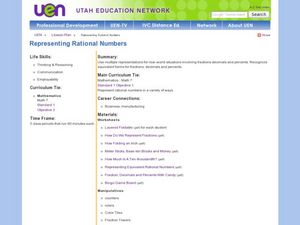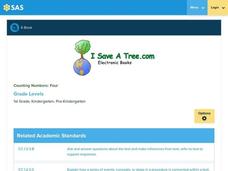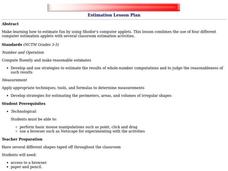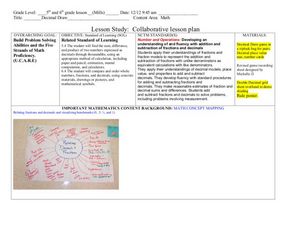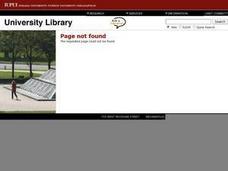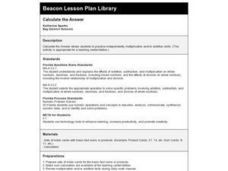Curated OER
Planning a Garden
Seventh graders research the World Wide Web to research and plan a garden for their school. They draw a scale model of the garden, determine the cost, and create a presentation to promote their garden plan.
Curated OER
Number Base
Eighth graders examine common number system bases that are used: decimal, binary, octa and hex. They create a presentation about one of the number systems using the internet to research the topic. They solve mathematical computations.
Curated OER
Measurements in Science
Eighth graders demonstrate knowledge of metric tools by measuring common objects in the classroom. They discuss the various units of metric measurement and the scientific tools used to take them. They copy a metric ladder from a Web site.
Curated OER
Design a Track
Pupils investigate track and field dimensions, measure an actual track, and construct a scale model. The use of a meter stick, dimensional analysis, and the application of the distributive property to variables forms the main focus of...
Curated OER
I Can Do This! Systems of Equations
Students solve systems of 2-by-2 linear equations using tables,
graphs and substitution. In small groups, classmates work together to discover strategies for solving equations. They use a calculator to graphically represent their answers.
Curated OER
Counting on Counting
Students recognize that counting tells how many objects are in the set irrespective of how they are arranged or the order in which they are counted. They solve problems involving one more or less to a given set using their knowledge of...
Curated OER
Geometry and Measurement
Students view a right triangle displayed by the teacher. Students measure legs and the interior angles of the triangle. They look for a pattern or relationship between the legs and angles. Students use pegboards and string to create more...
Curated OER
Function Lesson Plan -- Asking for Repetition
Young scholars with disabilities are tested in the use of language and taught the skill of asking for repetition in order to gain clarification and thus improve comprehension. They are assessed according to the practice of asking with...
Curated OER
Measurement Mania
Second graders observe and demonstrate how to measure different objects. They listen to the book "Corduroy," and measure different aspects of a teddy bear, discuss how to measure using a variety of units of measurement, and complete a...
Curated OER
The Customer Service Chain
Students identify and interpret the importance of customer service.
Then they identify the concept of customer chain and the meaning of the quality paradigm. Students also identify and define the role of quality in competitiveness and...
Curated OER
Representing Rational Numbers
Seventh graders explore rational numbers. In this fractions, decimals, and percents lesson, 7th graders identify and compare equivalencies between fractions, decimals, and percents. Students use hands-on activities to investigate the...
Curated OER
Editorial Writing as a Catalyst for Discussion of Important Issues
Learners decide which issues are most important to their student body and work in cooperative learning groups to write editorials. In this editorial writing lesson, students brainstorm a list of the most important issues and bring...
Curated OER
Let's Get Physical
Students collect data using the CBL. In this statistics activity, students predict the type of graph that will be created based on the type of activity the person does. The graph represents heart rate depending the level of activity.
Curated OER
The Fat and the Lean
Students collect data on calorie intake. In this algebra lesson, students use the collection of data to make better eating decisions. They investigate the nutritional value in food using a graph and draw conclusion from their findings.
Curated OER
Similar Triangles - Applied Problems
Young scholars differentiate between similar and congruent triangles. In this geometry lesson, students identify the angles of triangles using the similarity theorem. They apply concepts of triangles to the real world.
Pennsylvania Department of Education
Counting Numbers: Four
Students practice counting to four. In this counting to four lesson plan, students access an e-book at "I Save A Tree.com" where they count items up to four. They examine the text and images which can be seen in both Spanish and English.
Curated OER
Estimation
Students complete computer activities about estimating if items are more or less than a given amount. In this estimation lesson plan, students also estimate measurements around the classroom.
Curated OER
Addition and Subtraction Facts To 20
First graders use manipulatives, flash cards, number sentences and story problems to practice their addition and subtraction facts to twenty.
Curated OER
Modeling Addition: Commutative Property and Zero Property
First graders practice modeling addition. In this hands-on addition lesson plan, 1st graders are introduced to the Commutative Property of Addition and the Zero Property of Addition through modeling and the use of manipulatives. This...
Curated OER
Decimals: Collaborative Lesson
Students explore mathematics by participating in a group activity. In this number value lesson, students identify the uses for decimals and how to best estimate whole numbers based on decimals and fractions. Students collaborate with...
Curated OER
Studies of the Eastern Worlds: Population Graphing
Seventh graders participate in several learning/research stations in which they view artwork from various countries of the Eastern world and collect information on the populations of the Eastern countries. They then use this information...
Curated OER
M&M: Multiplication Madness
Students analyze the multiplication facts from zero to ten in the ten lessons of this unit. The concepts of mental multiplication and solving word problems are important components of this unit.
Curated OER
Microteaching
Tenth graders use the mathematical program, MATHEMATICA and graph linear and quadratic equations. They sketch the graph of an equation manually. Students compare their sketch with the computer generated model of the graph.
Curated OER
Calculate the Answer
Students solve basic multiplication or addition facts using a calculator and product cards. They draw a card, read the sum or product, and press single digits on the calculator to display the number on the card.





